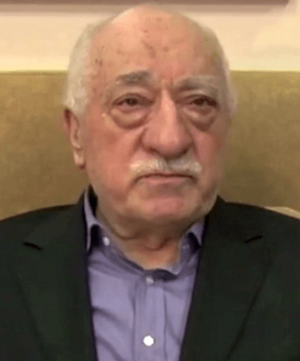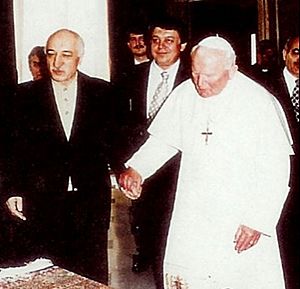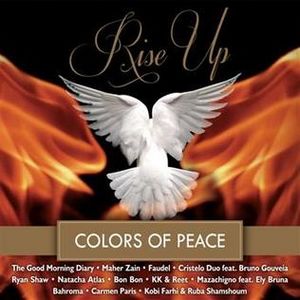Fethullah Gülen facts for kids
Quick facts for kids
Fethullah Gülen
|
|
|---|---|

Gülen in 2016
|
|
| Born |
Muhammed Fethullah Gülen
27 April 1941 Pasinler, Erzurum, Turkey
|
| Died | 20 October 2024 (aged 83) Pennsylvania, U.S.
|
| Occupation |
|
| Known for | Gülen movement |
| Writing career | |
| Subject |
|
| Literary movement | Nurcu |
| Notable work | The Essentials of the Islamic Faith |
| Notable awards | 2015 Gandhi King Ikeda Award for Peace |
|
Philosophy career |
|
| School | Hanafi |
|
Main interests
|
|
|
Influences
|
|
Muhammed Fethullah Gülen (born April 27, 1941 – died October 20, 2024) was an important Turkish Muslim scholar, preacher, and writer. He led a large group of followers known as the Gülen movement. This movement, also called Hizmet, focuses on education, helping others, and talking with people from different backgrounds.
Gülen was a local state imam (a Muslim religious leader) in Turkey for many years. He lived in the United States from 1999 until his death in 2024. He was known for promoting a peaceful form of Islam that values hard work, kindness, and learning.
Over time, Gülen became a key figure in Turkey's politics. His movement first worked with the Justice and Development Party (AKP) led by Recep Tayyip Erdoğan. This alliance helped weaken other political groups. However, their relationship broke down in 2011. Turkish officials later accused Gülen of trying to overthrow the government, including being involved in a coup attempt in 2016. Gülen always denied these accusations.
Turkey issued an arrest warrant for Gülen and asked the United States to send him back. However, U.S. officials did not find evidence that he was involved in terrorist activities and did not agree to send him back.
Contents
Early Life and Education
Muhammed Fethullah Gülen was born in a village called Korucuk, near Erzurum, Turkey. His parents were Ramiz and Refia Gülen. There are different ideas about his exact birth date, but many sources say it was April 27, 1941.
Gülen's father was an imam. His mother taught the Qur'an in their village, even though informal religious teaching was not allowed by the government at that time. Gülen's regular schooling ended when his family moved. He then studied Islamic education in madrasas (religious schools) in Erzurum. He was greatly influenced by the ideas of a Kurdish scholar named Said Nursî. Gülen gave his first official sermon as a state preacher in 1958 when he was still a teenager.
In 1959, Gülen became an assistant imam in Edirne. He worked in the Turkish civil service until he stopped his official preaching duties in 1981.
Growing Influence
In March 1971, while Gülen was teaching in İzmir, the Turkish military took control of the government. This happened to stop political violence in the country. Gülen was arrested during this time. He was accused of organizing a secret religious group based on his teachings and was held in prison for seven months.
During the 1980s and 1990s, Gülen's influence grew steadily. More and more people became his followers. From 1988 to 1991, he gave many sermons in popular mosques in major cities. In 1994, he helped start the Journalists and Writers Foundation. He was given the title "honorary president" by this group.
Moving to the U.S.
In 1999, Gülen moved to the United States for medical treatment. He decided to stay there. At that time, Turkish law aimed to ensure a modern, non-religious government. Religious activities not approved by the state were against the law. Gülen was being investigated for possibly trying to change the government, especially after some of his comments were aired after he moved to the U.S. These comments seemed to support an Islamic state.
In June 1999, after Gülen had left Turkey, videos were sent to Turkish TV stations. In these videos, Gülen seemed to say that his followers should work within the existing system to change it for Islam when the time was right.
In 2000, Gülen was tried in Turkey while he was not present. He was found guilty of trying to place his supporters in important government jobs to overthrow the government. Gülen said his words were taken out of context. His supporters also questioned if the video was real, saying it had been "manipulated."
In 2008, Gülen's conviction was overturned. This happened under the new government of Prime Minister Recep Tayyip Erdoğan's AKP. This move showed that Erdoğan's party and Gülen's movement were working together. Gülen's movement had a growing network of media, banks, and schools in Turkey and other places.
As Turkey changed in the 2000s, it became easier for Muslims to take part in public life. Many people educated in schools inspired by Gülen's ideas became part of Turkey's government, courts, and military. While Gülen's movement always said it stayed out of politics, in the 2011 election, its media strongly supported Erdoğan and his party. This led to another big win for the AKP.
However, tensions grew between Erdoğan and Gülen. Erdoğan began to see Gülen's movement as a rival. In 2014, a Turkish court issued an arrest warrant for Gülen. He was accused of creating and leading a "terrorist group."
After the attempted coup in 2016, many people linked to Gülen's movement were arrested or imprisoned in Turkey. The authorities shut down all of Gülen's media and business operations in Turkey.
Later Life and Passing
Gülen lived at the Chestnut Retreat Center in Pennsylvania, United States. This center is linked to the Hizmet movement. About thirty people lived and worked there. Gülen himself lived in small rooms, paying rent from his book earnings. He was reported to be in poor health.
Fethullah Gülen passed away at a hospital in Pennsylvania on October 20, 2024, at the age of 83. He was being treated for heart and kidney problems. Because of the political situation in Turkey, he was expected to be buried in Pennsylvania, even though he had wished to be buried in Izmir, Turkey.
Ideas and Activities
The Gülen Movement
The Gülen movement, also known as Hizmet, is a worldwide movement inspired by Gülen's teachings. His ideas about hizmet (which means selfless service for the good of everyone) have attracted many supporters in Turkey, Central Asia, and other parts of the world.
Education
Gülen believed that studying subjects like physics, mathematics, and chemistry was a way of worshipping God. He also thought that a good religious education could help young Muslims understand their faith deeply. This would help them resist radical ideas.
Gülen's followers have built over 1,000 schools around the world. In Turkey, these schools were known for being excellent. They had modern facilities and taught English from a young age.
Interfaith Dialogue

During the 1990s, Gülen started to promote tolerance and dialogue between different religions. He met with leaders from other faiths, including Pope John Paul II, the Ecumenical Patriarch Bartholomew I of Constantinople (a leader in the Orthodox Christian church), and Israeli Sephardic Chief Rabbi Eliyahu Bakshi-Doron.
Gülen believed that people of different religions, as well as religious and non-religious people, should work together in society. He also showed support for some requests from Turkey's Alevi minority, like recognizing their places of worship. He said that Alevis "definitely enrich Turkish culture."
Books and Writings
Gülen wrote many books, essays, and articles on various topics. These included social, political, and religious issues, as well as art, science, and sports. He also recorded thousands of audio and video tapes. He wrote the main article for several Islamic philosophical magazines like The Fountain and Sızıntı. Many of his books have been translated into English.
Some of his notable books include:
- The Messenger of God: Muhammad
- Reflections on the Qur'an: Commentaries on Selected Verses
- Toward Global Civilization Love and Tolerance
- From Seed to Cedar: Nurturing the Spiritual Needs in Children
- Terror and Suicide Attacks: An Islamic Perspective
- Journey to Noble Ideals: Droplets of Wisdom from the Heart
- Speech and Power of Expression
- Selected Prayers of Prophet Muhammad
Rise Up (Colors of Peace) Album
Rise Up (Colors of Peace) was a music project that turned Gülen's poems and writings in Turkish language into songs. About 50 of his poems were sent to different artists from various countries, both Muslim and non-Muslim. These artists chose a poem, then composed and sang it. They recorded the songs in their own countries and sent them back for the album. The project allowed artists to use any instruments they wanted, even though some stricter Muslim groups have reservations about music.
The album Rise Up (Colors of Peace) became a collection of world music. It included different styles like jazz, pop, flamenco, rai, and Indian music. The project took more than two years to complete. The album was released in 2013 by Nil Production and Universal Music.
See also
 In Spanish: Fethullah Gülen para niños
In Spanish: Fethullah Gülen para niños
 | Mary Eliza Mahoney |
 | Susie King Taylor |
 | Ida Gray |
 | Eliza Ann Grier |


